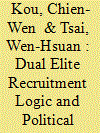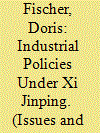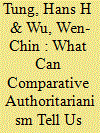|
|
|
Sort Order |
|
|
|
Items / Page
|
|
|
|
|
|
|
| Srl | Item |
| 1 |
ID:
183633


|
|
|
|
|
| Summary/Abstract |
Under Xi Jinping, the cadre recruitment policy of the Chinese Communist Party (CCP) has been adapted. What are the political implications of these adaptations? This paper argues that Xi has sought to consolidate his power among the political elite and strengthen grassroots governance by introducing a new cadre recruitment policy. We propose the concept of “dual elite recruitment logic” as an aid to interpreting the cadre recruitment strategy in the Xi era: the CCP’s system for appointing and promoting cadres at the full provincial/ministerial level (正部级 zhengbuji) and the grassroots follows’ criteria that are different from those formulated under the previous “rejuvenation of cadres” principle. While China under Xi may be able to maintain political stability and promote socio-economic development in the short term, the lack of a new succession mechanism is the biggest obstacle to China’s future political development.
|
|
|
|
|
|
|
|
|
|
|
|
|
|
|
|
| 2 |
ID:
183634


|
|
|
|
|
| Summary/Abstract |
Xi Jinping’s ascension to power and subsequent developments in Chinese governance have stoked the flames on the debate on industrial policies, both in China and across the globe. At least partly, the debate results from the perception that industrial policies have been important for China’s economic rise, growing competitiveness and drive to innovate. Outside China, this perception has already prompted some governments to suggest that their countries should react to China’s rise by also promulgating industrial policies. But inspite of the growing interest in the topic, there is hardly a consensus on the character of China’s industrial policies nor their efficiency and effectiveness, neither inside nor outside of China. This paper will shed light on these issues by looking at Chinese industrial policies from the perspective of political steering theory. It will first review the political steering theory, identify key concepts (steering modes, steering objects and subjects, etc.) and then explain the rationale of applying the theoretical deliberations to industrial policymaking and implementation in China’s EV and solar sectors. Against this background, this paper will identify different types of industrial policies and look into Chinese industrial policy development and academic discussion over time with a specific focus on changes in industrial policy steering following the inauguration of the Xi Jinping administration. This paper aims to make a conceptual contribution based on the analysis of policy documents and academic texts as well as discussions and interviews with Chinese economists and political scientists. It is part of a larger research project that focuses on how political steering through industrial policies affects China’s energy transition under Xi.
|
|
|
|
|
|
|
|
|
|
|
|
|
|
|
|
| 3 |
ID:
183635


|
|
|
|
|
| Summary/Abstract |
The development of renewable energy policies in Taiwan has been thoroughly discussed from political, economic, social, industrial and environmental perspectives. Energy policies, particularly those adopted by the United Nations (UN) and other international organizations, have influenced both (1) the decision-making process of energy policies such as action plans, programs and (2) the transition to renewable energies. This paper argues that the transfer of global environmental and energy policies serves as the mechanism behind Taiwan’s efforts to expand renewable energy production. These global policies have so far been practiced by international organizations through agreements designed to combat climate change, achieve sustainable development goals (SDGs), and reduce fossil fuel subsidies. This paper examines renewable energy policies and legislation in Taiwan through the lens of policy transfers, an area which has not been fully explored in previous research.
|
|
|
|
|
|
|
|
|
|
|
|
|
|
|
|
| 4 |
ID:
183632


|
|
|
|
|
| Summary/Abstract |
This paper evaluates the progress and impact of the literature on comparative authoritarianism, showing not only how its development over the previous two decades can help us understand China’s authoritarian politics better, but also how the latter can move the former forward. We focus on two important topic areas in the literature: authoritarian power-sharing and autocratic politics of information (e.g., partial media freedom and government censorship). For the first topic, we shall review the literature on the authoritarian power-sharing between dictators and their allies and explicate how this conceptual innovation helps us understand the institutional foundation of China’s regime stability and phenomenal economic performance before Xi Jinping. The analysis then provides us a baseline for assessing China’s economic and political future under Xi Jinping given his clear departure from the pre-existing power-sharing framework. Finally, this paper also assesses the relevance of the literature on authoritarian politics of information to the Chinese context. In sum, we not only emphasize the conceptual contributions of the literature of comparative authoritarianism to the field of Chinese politics, but also identify lacunae in the current literature and avenues for future research that post-Xi political developments have made visible to us.
|
|
|
|
|
|
|
|
|
|
|
|
|
|
|
|
|
|
|
|
|